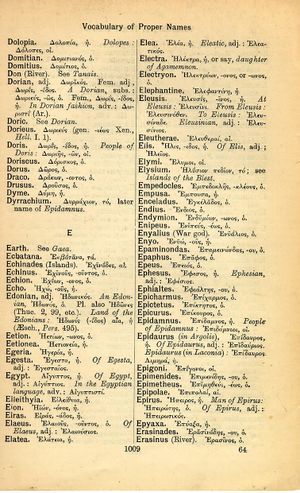Empedocles
ὀδοῦσι καὶ ὄνυξι καὶ πάσῃ μηχανῇ → tooth and nail | tooth, fang, and claw | in every possible way | by hook or by crook
English > Greek (Woodhouse)
Ἐμπεδοκλῆς, -κλέους, ὁ.
Latin > English (Lewis & Short)
Empĕdŏcles: is (
I gen. -cli, Gell. 4, 11, 9; acc. -clem, Cic. Ac. 1, 12, 44; -clen, id. ib. 2, 5, 14 al.), m., = Ἐμπεδοκλῆς, a famous natural philosopher of Agrigentum, about 460 B. C., Lucr. 1, 716 sq.; Cic. N. D. 1, 12; id. de Or. 1, 50, 217; id. Tusc. 1, 9, 19; Quint. 1, 4, 4; 3, 1, 8; Plin. 29, 1, 4, § 5; Gell. 17, 21, 14; Hor. Ep. 1, 12, 20; id. A. P. 465.—Hence,
II Empĕdoclēus, a, um, adj., Empedoclean: sanguis (acc. to his doctrine, the soul), Cic. Tusc. 1, 17 fin.— Subst.: Empĕdoclēa, ōrum, n., Empedoclean doctrines, id. Q. Fr. 2, 11 fin.>
Latin > French (Gaffiot 2016)
Empĕdŏclēs,¹⁴ is, m. (Ἐμπεδοκλῆς), Empédocle philosophe d’Agrigente] : Cic. Tusc. 1, 19 || -ēus, a, um, d’Empédocle : Cic. Tusc. 1, 41 ; Empedoclea, n. pl. Cic. Q. 2, 11, 3, doctrine d’Empédocle.

